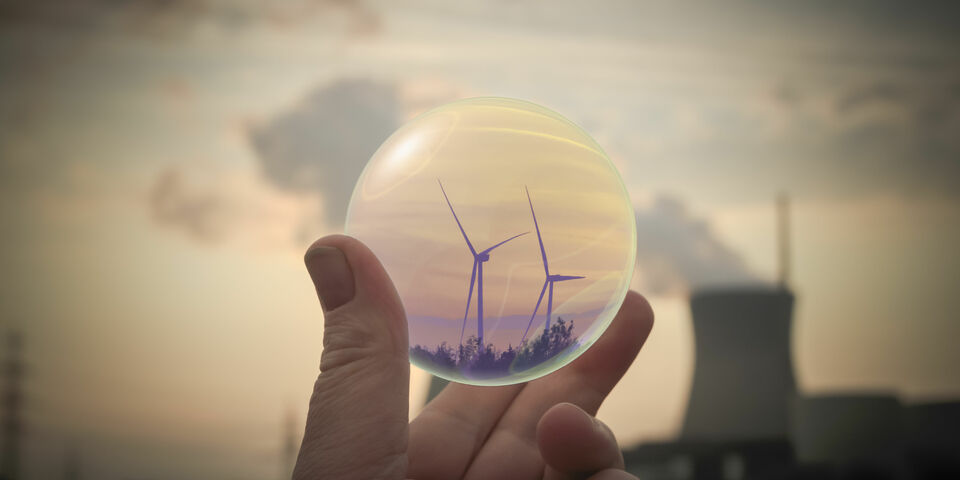Major grant to kickstart Dutch energy transition
The change to sustainable energy and mobility in the Netherlands is faltering, in spite of numerous technological innovations and the clear economic benefits of such a transition. TU/e and four other universities in the Netherlands will therefore develop new methods and techniques to give the transition a major boost. They will work within the framework of NEON, a multidisciplinary research programme in which engineers cooperate closely with social scientists, NGOs and companies. The Dutch Research Council (NWO) supports the programme, which will run for five years, with a grant of almost 8.5 million euros.
The human race is rapidly destroying the ecosystem on which it depends. Therefore, in 2017 nearly 200 countries, including the Netherlands, signed the Paris climate agreement, in which they pledge to limit global warming to a maximum of 2 degrees. However, our country is lagging far behind when it comes to achieving this objective. The share of renewable energy sources in our total energy supply is one of the lowest in the world; we still emit too much CO2 in our cars and lorries, while our roads are clogging up, bringing with it all kinds of costs.
Humans and institutions first
According to the researchers behind NEON (New Energy and mobility Outlook for the Netherlands), three problems currently stand in the way of a rapid transition to a sustainable future:
- Investments often do not go to the technologies with the biggest impact, but to those with the shortest time to the market;
- Promising solutions often fail due to institutional problems or resistance from citizens, when applied on a large scale;
- Science currently lacks quantified models to calculate the fastest and most cost-effective solutions.
In order to meet these three challenges, NEON believes that more is needed than just technology and economic opportunity. They propose a multidisciplinary approach, in which the role of institutions, knowledge networks and human actors, such as consumers and companies, is given a much more prominent place. The researchers want to develop new methods and techniques for this, thus contributing to the necessary change in our energy supply and mobility.
Top researchers
The NEON project has a total budget of 12.5 million euros, with 8.5 million euros coming from NWO. The money will enable a total of 32 PhD students to get started, twenty of whom will employed at TU/e. In addition to TU/e, the universities of Rotterdam, Tilburg, Twente, Delft, Amsterdam University of Applied Sciences, PBL and TNO are also taking part in the research. They work closely with 18 companies from the Netherlands and abroad, as well as various governments and NGOs.
TU/e programme director Auke Hoekstra is extremely pleased with the grant: "Thanks to NWO, we are able to make a combination of alpha, beta and gamma scientists that, as far as I know, is completely unique in the world. They are supported by a strong consortium of national and internatinal knowledge institutions, innovative companies, NGOs and governments. Now it's a matter of finding 32 top PHD researchers".
Other TU/e researchers involved in NEON are Maarten Steinbuch, Floor Alkemade, Theo Hofman and Korneel Wijnands, amongst others.
Crossover
The NEON grant is part of the Crossover programme of NWO, which has an overall budget of 39 million euros. A total of five large interdisciplinary projects receive a subsidy within the programme. TU/e also plays a prominent role in three of the four other projects:
- INTENSE (Innovative Neurotechnology for Society)
This project will develop brain implants to improve the lives of people who are blind, deaf or paralysed or who suffer from epilepsy. The research will combine the strongly increased knowledge about our brain with new possibilities within neurotechnology with the aim of realising new solutions and commercial opportunities. One of the researchers involved is Mark Bentum.
- RELEASE (Reversible Large-scale Energy Storage)
This project also focuses on the transition to sustainable energy, but specifically on improving performance and reducing the costs of large-scale energy storage. The project will focus on hydrogen and hydrocarbon production from CO2 and flow batteries. On behalf of TU/e, Emiel Hensen and Kitty Nijmeijer, among others, will contribute to this research.
- SYNERGIA (System change for New Ecology-based and Resource efficient Growth with high tech In Agriculture)
The aim of this programme is to develop a new production system for Dutch agriculture that takes ecology as its starting point and is supported by smart technology. It will involve contributions from, among others, the following TU/e researchers: Andrea Fiore, Kevin Williams, Marion Matters, Ed Nijssen en Rene van de Molengraft.


Discussion